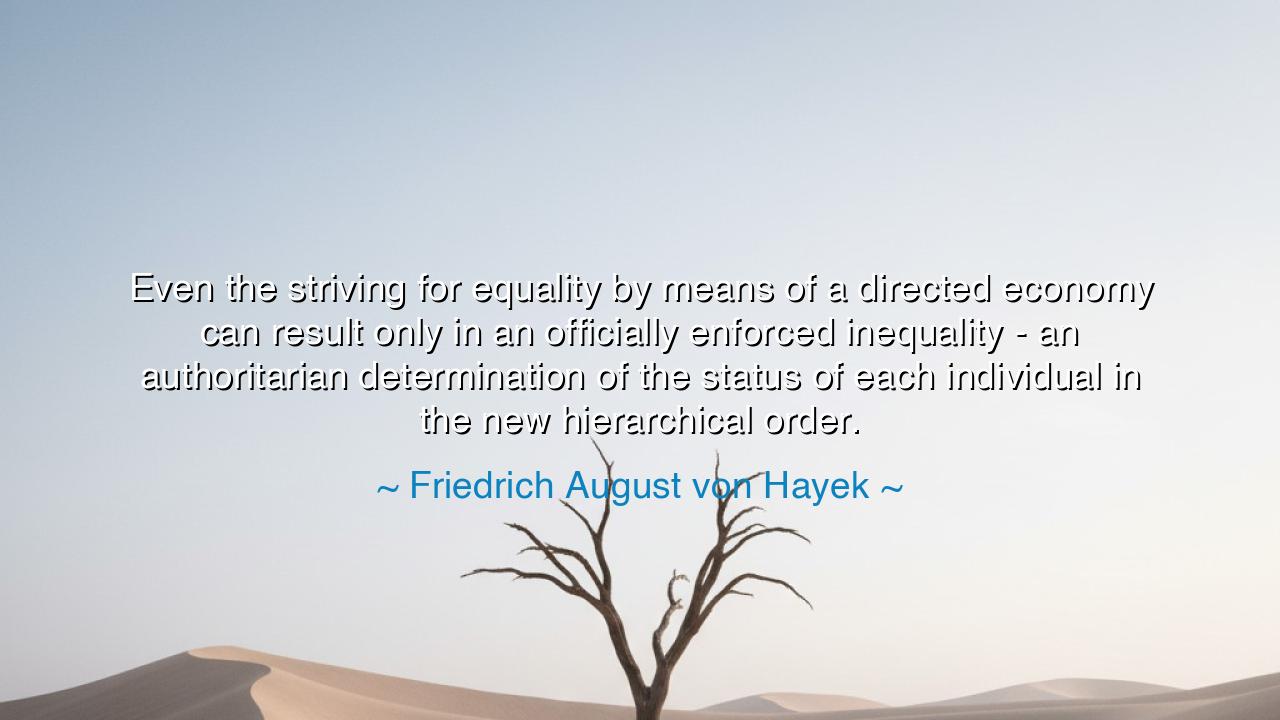
Even the striving for equality by means of a directed economy can
Even the striving for equality by means of a directed economy can result only in an officially enforced inequality - an authoritarian determination of the status of each individual in the new hierarchical order.






“Even the striving for equality by means of a directed economy can result only in an officially enforced inequality — an authoritarian determination of the status of each individual in the new hierarchical order.” Thus wrote Friedrich August von Hayek, the great economist and philosopher of liberty, whose words burn like a torch against the darkness of tyranny. In this sentence lies a warning not merely for one age, but for all ages: that the pursuit of equality, if compelled by force rather than guided by freedom, does not lift humanity upward but chains it under new masters. Hayek, in his wisdom, speaks of the paradox that arises when men, in seeking fairness, surrender their independence—and in doing so, replace the natural differences of life with the cruel, artificial hierarchies of power.
The origin of this quote lies in the great storms of the twentieth century, when nations across the world grappled with the promises and perils of central planning. Hayek, born in 1899 in Vienna, lived through the collapse of empires, the rise of fascism, and the seductions of socialism. He watched as societies, weary of inequality, placed their faith in the hands of governments that promised justice by decree and prosperity by design. But to Hayek, these promises were illusions. He saw that when men entrust their fate to a central power—believing it can distribute wealth and opportunity evenly—they also hand over their freedom. The result, he warned, is not equality, but authoritarianism—a system where some few dictate the destiny of all.
To Hayek, true equality was not born of compulsion, but of liberty. The free market, though imperfect, reflected the organic diversity of human effort, talent, and choice. It allowed every man and woman to rise by their own merit, guided not by the edicts of rulers but by the invisible hand of voluntary exchange. In contrast, a directed economy—where the state controls production and distribution—must assign every person a role, a ration, a rank. To direct is to decide; to decide is to divide. Thus, in the name of equality, the state inevitably becomes the arbiter of inequality. Hayek saw this with prophetic clarity: when government assumes the power to make men equal, it must first assume the power to make them unequal.
History bears witness to his words. Consider the fate of the Soviet Union, born in revolution and clothed in the rhetoric of equality. Its founders promised a world where all men would share equally in labor’s fruits. But in the quest to enforce this dream, they created a vast machinery of control. Bureaucrats, planners, and party officials determined who worked where, who received what, who prospered, and who perished. The result was not equality, but a new hierarchy of power, one that ruled by fear instead of wealth. The factory worker and the farmer did not stand beside the commissar as equals; they bowed before him as subjects. The dream of justice had become the nightmare of oppression.
And yet, Hayek’s message is not merely condemnation—it is instruction. He reminds us that the pursuit of justice must be bound to freedom, or else justice itself will perish. To seek equality by coercion is to deny the dignity of choice; to impose fairness from above is to strip life of its natural harmony. True equality, he teaches, is not sameness, but opportunity—the freedom for each soul to rise or fall by its own endeavor. It is not the leveling of results, but the leveling of restraints. Only when no man holds dominion over another’s destiny can there be true balance in society.
His words are also a reflection on human nature itself. For there is in every generation the temptation to trade freedom for security, to believe that fairness can be engineered, and that happiness can be decreed. But as Hayek warns, every system that begins with the promise of equality ends with the command of obedience. Authoritarianism does not arrive with swords and chains, but with smiles and policies—policies that whisper, “Let us take care of you.” And by the time a people realize the cost, their liberty has already been quietly buried beneath bureaucracy and fear.
So, my listener, take this lesson into your heart: guard your freedom more fiercely than your comfort. Do not seek equality through control, but through compassion; not through laws of force, but through laws that preserve choice. Remember that no government, however noble its intention, can make men equal in spirit, for the human soul is infinite and unique. The wise do not demand uniformity—they celebrate diversity.
And thus, Hayek’s wisdom endures like the voice of an ancient oracle: that freedom is the soil in which justice grows, and control is the frost that kills it. To strive for equality by command is to build a new pyramid of masters and servants, crowned by the cold smile of tyranny. But to strive for freedom—patiently, persistently, and with faith in the human heart—is to honor the divine order of creation itself. For in freedom, each soul may find its own place under heaven, and all may rise—not as equals in station, but as equals in dignity before God and before one another.






AAdministratorAdministrator
Welcome, honored guests. Please leave a comment, we will respond soon